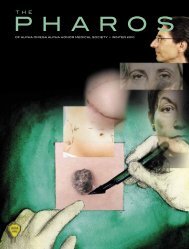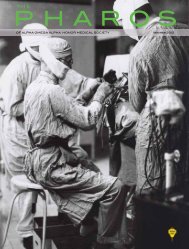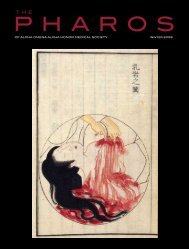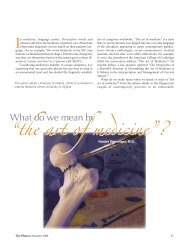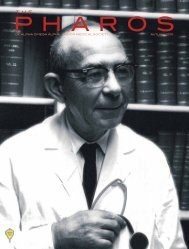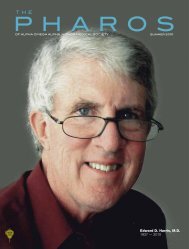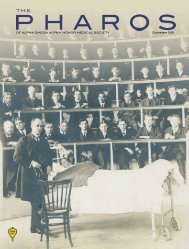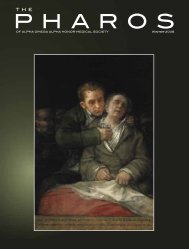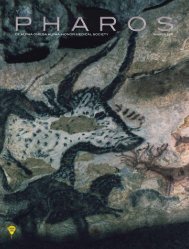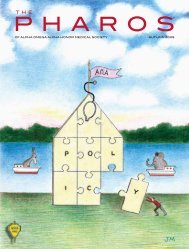The Pharos - Alpha Omega Alpha
The Pharos - Alpha Omega Alpha
The Pharos - Alpha Omega Alpha
Create successful ePaper yourself
Turn your PDF publications into a flip-book with our unique Google optimized e-Paper software.
urgings and plows the rocky fields, dragging the boy through<br />
the mud. Despite this success, the turnip crop that the farmer<br />
had planned to use to pay off his debts fails. Shortly thereafter<br />
war is declared with Germany. A rider cries out, “We will ring<br />
the bells and will not ring them again until the war is over.”<br />
Young men sign up for what they think will be a very quick<br />
victory, promising that they will be home by Christmas. In<br />
the background, we hear strains of “<strong>The</strong> Roses Are Blooming<br />
in Picardy.” <strong>The</strong> town’s horses are commandeered and Joey<br />
is bought for thirty guineas by Captain James Nicholls (Tom<br />
Huddleston), who promises the boy that he will take good care<br />
of the horse and to keep in touch. <strong>The</strong> performances of the<br />
actors, especially the young boys, are excellent, but the star of<br />
the show is Joey. We see him buddying up with a fellow equine<br />
as they train to execute a cavalry charge before embarking for<br />
France in 1914.<br />
<strong>The</strong>re is a Pickett’s type charge in which the British emerge<br />
from the tall grass into the open to try to surprise the Germans;<br />
unfortunately the Germans are ready for them and mow them<br />
down. As the camera pans over the dead men and horses, a<br />
German officer expresses amazement to a British officer for believing<br />
that his men would be left undefended. Most horses are<br />
shot, but Joey and his buddy survive. <strong>The</strong>y are cared for by two<br />
German brothers who desert but are caught at a French farm<br />
and shot by their compatriots. <strong>The</strong> farmer and his daughter are<br />
the new owners; their brief story provides a pleasant interlude<br />
before the film turns grim and the cinematography gray, as the<br />
war deteriorates to trench warfare of attrition with episodic<br />
charges and retreats. A harsh German orders all horses including<br />
Joey and his buddy to pull artillery, and predicts that they<br />
all will be dead in a month. Joey’s buddy dies and Joey tries to<br />
escape. <strong>The</strong>re is a very striking scene in which the Germans<br />
and the Brits with no man’s land between them call a cease fire<br />
while they work to free Joey from barbed wire.<br />
<strong>The</strong> film brings home the futility of World War I, so starkly<br />
shown in All Quiet on the Western Front and <strong>The</strong> Grand<br />
Illusion. It reminds us of the consequences of both World Wars<br />
I and II, with the loss of two generations of the best young men<br />
profoundly altering the demographics of post-war Britain,<br />
France, and Germany, as well as, to a lesser extent, North<br />
America. <strong>The</strong> demographic effects go a long way to explaining<br />
what we see today in terms of the transformation of European<br />
countries. <strong>The</strong> film also shows the hardscrabble existence of<br />
farmers who remain loyal to one another and to the land. It’s a<br />
generation back from the life pictured in All Creatures Great<br />
and Small. Those who liked that particular TV series should<br />
enjoy this film. It was nominated for an Academy Award for<br />
Best Picture. While not a great film, it tells an interesting story<br />
about people one can care about. If you decide to watch it and,<br />
like me, have lost some hearing and have difficulty with foreign<br />
accents and dropped words, I suggest you turn on the English<br />
subtitles option on your DVD.<br />
Addendum: Joey was played by fourteen horses. <strong>The</strong> main<br />
one, named Finder, also played Secretariat in the recent movie.<br />
Spielberg used almost no digital effects so what you see filmed<br />
was live action. <strong>The</strong> barbed wire was rubber so as not to injure<br />
the horses. 2<br />
References<br />
1. Morpurgo M. War Horse. New York: Scholastic Press; 2011.<br />
2. IMDb.com. War Horse. http://www.imdb.com/title/<br />
tt1568911/.<br />
To Rome with Love<br />
Starring Woody Allen, Penelope Cruz, Jesse Eisenberg, Alec<br />
Baldwin, and Ellen Page.<br />
Directed by Woody Allen. Rated R. Running time 102 minutes.<br />
R<br />
ecently I reviewed Midnight in Paris and found it to be<br />
so enchanting that I rashly said that Woody Allen was<br />
back. <strong>The</strong> movie was an imaginative, funny, and beautifully<br />
filmed paean to Paris, opening with a stunning kaleidoscopic<br />
tour that evoked many happy memories of the City of Lights.<br />
To say that his follow-up film is terrible is an understatement.<br />
How could such a talented director and cast make such a bad<br />
film with the eternal city as a backdrop? Think of all those<br />
wonderful scenes in Roman Holiday and you will know what<br />
I mean. This film is clichéd, unfunny, pretentious, and populated<br />
with people you wouldn’t want to spend ten minutes<br />
with, let alone 102 minutes. I almost bailed on the film, but I<br />
kept hoping it would get better and didn’t want to disturb the<br />
guy next to me.<br />
Okay, let’s start with “unimaginative.” In contrast to the<br />
beautiful opening of Midnight in Paris, this film opens in<br />
front of the monstrosity popularly called “the wedding cake,”<br />
a tribute to King Victor Emmanuel. <strong>The</strong> next image is of the<br />
balcony where Mussolini pompously held forth. I did like<br />
seeing the policeman (Pierluigi Marchionne) who stands on<br />
that pedestal and directs traffic through the circle with élan,<br />
but soon I was overwhelmed by the first vignette, a clichéd<br />
tale of a dippy American girl, Hayley (Allison Pill), stopping<br />
a handsome Italian Michelangelo (Flavio Parenti) to ask for<br />
directions to La Fontana di Trevi. He offers to take her there<br />
and before you know it, they are planning marriage. Cue up<br />
the Four Aces singing “Three Coins in the Fountain.”<br />
How about “unfunny?” Allen’s obsessions are sex and death<br />
(see Everything You Wanted to Know about Sex: But Were<br />
Afraid to Ask and Love and Death). <strong>The</strong> death part comes with<br />
his stressing over the turbulence during the flight to Rome to<br />
meet his future son’s family, as well as his reaction to the fact<br />
that the young man’s father, Giancarlo (Fabio Armiliato), is a<br />
mortician and he’s not sure whether to shake his hand or eat<br />
anything in his house. It turns out that the father’s hobby is<br />
<strong>The</strong> <strong>Pharos</strong>/Autumn 2012 35



